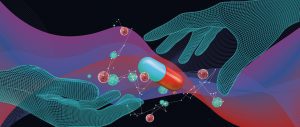AI is empowering precision medicine to its fullest extent for the aim of human well being
When it comes to artificial intelligence, it seems as though the possibilities are endless in regards to its use cases. AI can be applied to practically any industry, from self-driving cars, to automated financial investing, or even the healthcare industry. In these scenarios, AI seems to be much more accurate and precise in comparison to the capabilities humans have due to the fact of human error and the extensive processes in which it is able to implement.
Artificial intelligence not only evades human error, but it also has the ability to implement prior knowledge of subjects to a certain scenario, as well as learn and upgrade its own understandings. When you apply this concept to self-driving vehicles, theoretically, they could improve to the point that there are zero car accidents, given no human error is implemented. When applied to financial investing, they could make returns that no man could ever dream of making.
The reality would be just about the same for practically any industry that you were to apply this to. It is almost impossible to comprehend the possibilities that AI entails, as it is in such a beginning phase of its life and we have only begun to unlock its potential. There are hundreds of industries in which AI could have amazing implementations, including precision medicine. There are hundreds of different ways in which AI can be integrated into medicine, each presenting the technology with new problems that require complex routes of learning in order to fully comprehend how to solve the particular problem.
What is important though is the possible outcomes that could come from these journeys of introducing AI to healthcare. When applied to precision oncology medicine for example, thousands, or even millions of lives could theoretically be saved every year, particularly through the use of high-throughput biomarker testing.
AI and Precision Medicine
Precision medicine involves the analysis of the genetics, environment, and lifestyle of a person in order to select treatment or prevention that works best for them. Although precision medicine cannot yet be used in many areas of healthcare, it is anticipated that many more will be able to adopt it in the coming years as technology such as artificial intelligence continues to advance. AI utilizes computation and prior knowledge to generate insights, allows itself to use reason and learn, and empowers clinical decision making.
According to “NCBI”, recent literature suggests that translational research exploring this convergence will help solve the most difficult challenges facing precision medicine, from patient symptoms, clinical history, and lifestyles, will facilitate personalized diagnosis and prognostication. There are three main ways in which AI will be introduced into the healthcare industry. These include data/security, analytics/insights, and shared expertise. Data and security refers to the actual information that is given to the AI. This data must be accurate and well proven in order for the technology to build upon this base of information. Analytics/insights, as well as shared expertise refer to the idea that issues should be seen as a team effort. Ideas should be shared between AI and experts in the field.
Typically, we think of AI to be an entity that should fully take over an entire process, but in reality, it should be something that works side by side with industry professionals. This would allow for overall understanding of topics to be increased in a more efficient manner, allowing constant growth and learning. Healthcare is a vast field, where there are hundreds of different factors that could play a part in the determination of what a problem is, and how to solve this problem.
With the help of AI, our understanding of these complexities is furthering every day, and problems are being solved at much more efficient rates. Problems are able to be solved before they are even known to be problems. All it takes for this to be possible is the access to the right data as well as good hardware technology that can process this data.
What exactly is AI and how does it integrate into the healthcare field?
The term AI can apply to a broad set of technology. Typically, when you think of AI, you think of a physical robot that has the ability to move around and even talk to you, but there are many other versions of AI. This physical AI might be useful in situations such as surgery, where it is important to be as precise and accurate as possible, but when it comes to solving problems, say, on a microscopic level, and there is nothing to physically do, artificial intelligence can simply be a program that is able to analyze endless amounts of data to come to a solution. AI holds the power to recognize intricate patterns in diagnostic systems and to generate ideas that might have taken humans years to solve, if ever at all.
With the integration of AI into healthcare, we might see a reduction of diagnostic errors as well as better pattern recognition and bias free reasoning. It is a common misconception to believe that AI will fully take over many industries, eliminating the need for any human interaction within a subject, but this does not seem to be the case. It seems as though there will always be a need for human interaction, as we can provide elements of problem solving that AI technology cannot. Especially in healthcare, there are many scenarios where a decision requires more thought than simply what a set of data can provide. In many situations, ethical dilemmas, expenses, and other factors must be weighed, rather than making decisions based simply on the chances of survival.
How AI can be beneficial to cancer patients?
Cancer is a very complex disease, having over 100 different types and subtypes, as well as several stages in which the particular tumor is in, that make every case different from others. In many cancer cases, doctors must prescribe a method of how to treat a certain cancer, whether it be surgery, chemotherapy, radiation therapy, immunotherapy, targeted therapy, stem cell transplantation, etc. When AI is introduced into this problem, the best route of treating the cancer can be created within a much faster span of time, as well as in a much more precise and accurate way, based on algorithms that AI has the ability to create and constantly upgrade.
This technology, theoretically, would have the ability to determine hundreds or thousands of new routes of treatment that would never have been thought of by humans. There is so much ambiguity when it comes to determining the best fit route of treatment in cancer. With every single case being slightly different from others, doctors can have a very difficult time prescribing a route that they think will be most effective. When AI takes this role, it would have the ability to apply data from hundreds or even thousands of other cases to prescribe a method of treatment as it holds a great potential for increasing the survival rates of numerous cases.



